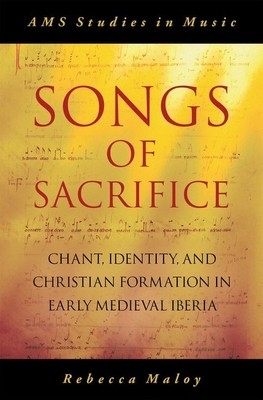
- We will send in 10–14 business days.
- Author: Rebecca Maloy
- Publisher: Oxford University Press, USA
- ISBN-10: 0190071532
- ISBN-13: 9780190071530
- Format: 16 x 23.6 x 3.3 cm, hardcover
- Language: English
- SAVE -10% with code: EXTRA
Reviews
Description
Between the seventh and eleventh centuries, Christian worship on the Iberian Peninsula was structured by rituals of great theological and musical richness, known as the Old Hispanic (or Mozarabic) rite. Much of this liturgy was produced during a seventh-century cultural and educational program aimed at creating a society unified in the Nicene faith, built on twin pillars of church and kingdom. Led by Isidore of Seville and subsequent generations of bishops, this cultural renewal effort began with a project of clerical education, facilitated through a distinctive culture of textual production.
Rebecca Maloy's Songs of Sacrifice argues that liturgical music--both texts and melodies--played a central role in the cultural renewal of early Medieval Iberia, with a chant repertory that was carefully designed to promote the goals of this cultural renewal. Through extensive reworking of the Old Testament, the creators of the chant texts fashioned scripture in ways designed to teach biblical exegesis, linking both to patristic traditions--distilled through the works of Isidore of Seville and other Iberian bishops--and to Visigothic anti-Jewish discourse. Through musical rhetoric, the melodies shaped the delivery of the texts to underline these messages. In these ways, the chants worked toward the formation of individual Christian souls and a communal Nicene identity. Examining the crucial influence of these chants, Songs of Sacrifice addresses a plethora of long-debated issues in musicology, history, and liturgical studies, and reveals the potential for Old Hispanic chant to shedlight on fundamental questions about how early chant repertories were formed, why their creators selected particular passages of scripture, and why they set them to certain kinds of music.
EXTRA 10 % discount with code: EXTRA
The promotion ends in 19d.02:26:45
The discount code is valid when purchasing from 10 €. Discounts do not stack.
- Author: Rebecca Maloy
- Publisher: Oxford University Press, USA
- ISBN-10: 0190071532
- ISBN-13: 9780190071530
- Format: 16 x 23.6 x 3.3 cm, hardcover
- Language: English English
Between the seventh and eleventh centuries, Christian worship on the Iberian Peninsula was structured by rituals of great theological and musical richness, known as the Old Hispanic (or Mozarabic) rite. Much of this liturgy was produced during a seventh-century cultural and educational program aimed at creating a society unified in the Nicene faith, built on twin pillars of church and kingdom. Led by Isidore of Seville and subsequent generations of bishops, this cultural renewal effort began with a project of clerical education, facilitated through a distinctive culture of textual production.
Rebecca Maloy's Songs of Sacrifice argues that liturgical music--both texts and melodies--played a central role in the cultural renewal of early Medieval Iberia, with a chant repertory that was carefully designed to promote the goals of this cultural renewal. Through extensive reworking of the Old Testament, the creators of the chant texts fashioned scripture in ways designed to teach biblical exegesis, linking both to patristic traditions--distilled through the works of Isidore of Seville and other Iberian bishops--and to Visigothic anti-Jewish discourse. Through musical rhetoric, the melodies shaped the delivery of the texts to underline these messages. In these ways, the chants worked toward the formation of individual Christian souls and a communal Nicene identity. Examining the crucial influence of these chants, Songs of Sacrifice addresses a plethora of long-debated issues in musicology, history, and liturgical studies, and reveals the potential for Old Hispanic chant to shedlight on fundamental questions about how early chant repertories were formed, why their creators selected particular passages of scripture, and why they set them to certain kinds of music.


Reviews